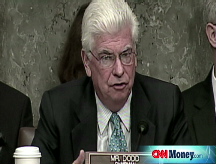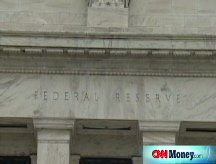Fed strikes $30B deal
The Federal Reserve to provide funds to central banks of Australia, Denmark, Norway and Sweden in order to increase dollar liquidity.
WASHINGTON (CNN) -- The Federal Reserve Bank announced a deal with four nations Wednesday meant to help increase dollar liquidity in global financial markets.
The Fed said it has established reciprocal-currency arrangements with the central banks of Australia, Denmark, Norway and Sweden.
The agreement allows the Fed to make up to $30 billion available to the central banks. The central banks of Australia and Sweden will be provided with $10 billion each while institutions in Denmark and Norway will get $5 billion each. In return, the Fed will receive the reciprocal amount of foreign currency from each country. Under these types of arrangements, the currency 'swaps' get unwound at a later date.
The U.S. central bank's move to increase liquidity by reaching out to other countries is part of a larger effort to restore some level of confidence to Wall Street, said one economist.
It shows that "the [U.S.] central bank has some depth to it, some ability to respond," said John Silvia, chief economist at Wachovia, adding, "there is a backstop there - the [Fed] is not out there by itself."
The Fed's announcement, made at 1 a.m. ET Wednesday, follows a similar initiative it unveiled last Thursday - ultimately a $247 billion reciprocal currency arrangement with the European Central Bank, Swiss National Bank, Bank of England, Bank of Canada and Bank of Japan.
The influx of money from the central banks represents an effort to put more money into financial markets and fuel economic activity.
Silvia said that the move does not necessarily mean that the Federal Reserve will use the line of credit immediately but rather that "they are getting ready for the future," said Silvia. "It is similar to what a business would do with a local bank," said Silvia. "[It] establishes that line of credit, which is absolutely essential."
In the current economic climate, with major financial and insurance institutions teetering, commercial banks have tightened their lending policies and increased interest rates, taking billions of dollars out of the economy.
"It is essential that the central banks do stand there and massage the trust back into action," David Buik of the BGC Partners brokerage firm in London said last week. "Without them, we would be in unbelievably uncontrollable turmoil."
Under the reciprocal-currency plan announced last Thursday, the European Central Bank will get up to $110 billion, the Swiss National Bank up to $27 billion, the Bank of Japan up to $60 billion, the Bank of England up to $40 billion and up to $10 billion from the Bank of Canada.
Both plans have been authorized by the Fed through Jan. 30, 2009.
With additional reporting by Catherine Clifford, CNNMoney.com staff writer ![]()



